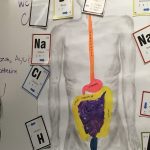U3: Energy Transformations_Properties of Energy
Core Curricular Competencies:
1. energy change during chemical reactions
2. practical applications and implications of chemical processes including First Peoples Knowledge
3. nuclear energy and radiation
4. law of conservation of energy
5. potential and kinetic energy
6. transformation of energy
7. local and global impacts of energy transformations from technologies
-
— Where does energy come from and what happens to it?
-
— How does energy in the form of radiation affect living things?
-
— How do energy transformations affect the environment?
Chemical potential energy is stored in the molecular bonds of sulphide minerals, such as iron sulphide (FeS2), and some of this energy is released when the sulphides are oxidized. Specialized bacteria can metabolically tap the potential energy of sulphides to support their own productivity, through a process known as chemosynthesis (this is further examined later in this chapter).
- The ionic bonds of salts also store chemical potential energy. For example, when sodium chloride (table salt, NaCl) is dissolved in water, ionic potential energy is released as heat, which slightly increases the water temperature.
- Hydrocarbons store energy in the bonds between their hydrogen and carbon atoms (hydrocarbons contain only these atoms). The chemical potential energy of gasoline, a mixture of liquid hydrocarbons, is liberated in an internal combustion engine and becomes mechanically transformed to achieve the kinetic energy of vehicular motion.
- Organic compounds (biochemicals) produced metabolically by organisms also store large quantities of potential energy in their inter-atomic bonds. The typical energy density of carbohydrates is about 16.8 kJ/g, while that of proteins is 21.0 kJ/g, and lipids (or fats) 38.5 kJ/g. Many organisms store their energy reserves as fat because these biochemicals have such a high energy density.
Introduction to Climate Change Chemistry (Science 10)
Introduction to Physics (Science 10):
 Loading...
Loading...
 Loading...
Loading...
Skill Builder 1: Rearranging Equations
Energy Transformation _Skill Builder
Concepts Covered:
- Unit Conversions
- Metric System
- Notes (blank) (filled)
- Check point A; KEY AA
Energy Transformation I
Concepts Covered:
Energy Produces Change in a System
 Loading...
Loading...
There are Different Forms of Energy
 Loading...
Loading...
Different forms of Energy Foldable:
 Loading...
Loading...
- Energy Can be Transformed
- Powerpoint
- Notes (blank); (filled)
- Worksheet and Key
The Future of Energy – Documentary
2. Systems and Transformations
- Notes
- Key
3. Energy Equations
Mechanical and Gravitational
Loading...
-
Fill in notes and practice
 Loading...
Loading...
-
GPE Practice Problems
 Loading...
Loading...
KE and PE
Fill in notes and Practice
 Loading...
Loading...
Kinetic Energy Practice Problems
 Loading...
Loading...
What is Energy?
Work Notes:
 Loading...
Loading...
Roller Coaster Lab
Ride A Virtual Roller Coaster:
- Lab Format & Rubric
Relationship PE and KE
- L4 Notes and Key



